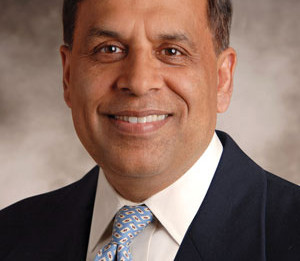Ash Gupta, president of the risk and information management group and chief risk officer at American Express, sat down with Dialogue to describe the future of big data in financial services.
How do you foresee big data changing your industry?
Big data isn’t a tool of the future. It’s arrived and it is transforming financial services companies. Big data is an ecosystem comprised of data, analytics, technology and the customer. It allows us to leverage large data sets with powerful and efficient analytics and cutting edge technology, which help drive meaningful dialogue with customers.
This is having a powerful effect on our business – helping us improve service and risk management as well as transform to a driver of commerce between Card members and merchants. Fundamentally, big data is changing societies. It makes many of the basic tools modern societies have come to rely on possible – such as Google search, Google maps, Amazon recommendations. Our industry has to evolve to meet the needs of these societies that are accustomed to having solutions at their fingertips.
But regardless of how the ecosystem matures, American Express’ core values – serving our customers and maintaining our integrity – remain the same.
How is your competition using big data?
Our competitors are banks as well as technology start-ups. Since so many technology start-ups are creating services with data, it’s difficult to point to one that is not using big data capabilities. Like American Express, our competitors are using big data to create customized offers for risk management and servicing purposes.
While start-ups are competitors, we look for ways to collaborate with them to improve our knowledge, drive innovation, build capabilities and find ways to deliver value to consumers.
What commercial advantage does big data bring to your business?
Information has always been core to American Express. We operate an integrated payments network. It is a closed-loop, end-to-end process that lets us analyze billions of transactions by more than 100 million Card Members at millions of merchants around the globe. Being able to use that information in a more robust way with the help of the big data ecosystem strengthens our closed loop. It creates new opportunities to drive commerce and serve customers across geographies.
It strengthens our risk management processes, helping ensure we remain a strong company in weak and strong economic cycles.
Big data is one of our most important tools in being the company we want to be – that identifies solutions to customers’ needs even before they are aware of them. It allows us to deliver what customers want today and what they may want in the future.
What challenges are there in working with big data?
Privacy and permissible purpose are paramount. We consider privacy and compliance with every big data use case. They must go hand-in-hand with big data innovation.
An ongoing challenge is balancing our big data investment between immediate needs and research or pie-in-the-sky ideas that will drive the next generation of capabilities. We can’t be seduced by one or the other.
One of my challenges is ensuring we are focused on driving outcomes that are helpful to customers, with shareholders being collateral beneficiaries.
How have your customers been delighted as a result of the insights you have gained from big data?
We have implemented big data use cases that are gaining traction with our customers. For example, our big data ecosystem powers our mobile “My Offers” platform, a feature on our mobile app where US Card Members can find and add offers from merchants. This platform leverages the company’s closed loop network, which connects Card Members and merchants while delivering value to both. We have been able to use the big data ecosystem to quickly analyze Card Member feedback emails and letters, and improve customer service.
Big data modelling is improving our accuracy in pinpointing fraudulent transactions while not disrupting genuine Card Member spend, something Card Members really want.
How has or will big data change the way you lead?
I have placed a emphasis on external collaboration. I recognize we cannot innovate all by ourselves. I spend a lot of my time thinking about how to work with partners and companies in the space. From a leadership perspective, it is important to communicate and collaborate to create company-wide excitement and promote learning. This includes having a two-way dialogue with our board, executive officers and thought-leaders in the industry about how big data is progressing at our company. We are learning together.
Less-tenured people on the team may possess more knowledge and wisdom about big data than others, and we need to create a culture that helps engage them in discussion and brings their ideas forward. I am aware of the importance of innovation and reacting to what is coming next. When I ponder questions like how can we top what we have done? How can we improve? How can we drive innovation? What will customers want in 10 years? These questions create excitement in my mind.
Ash Gupta is president, risk and information management group, and chief risk officer at American Express.



